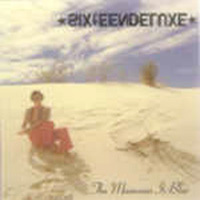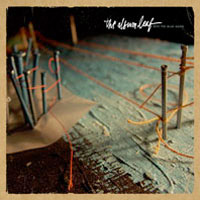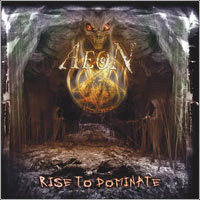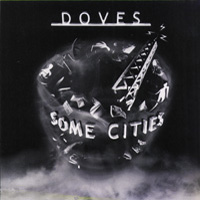 Doves
Doves
Some Cities (Capitol)
An interview with guitarist/vocalist Jez Williams
By Tim Den
A new Doves album automatically means that my life is 1000 times better, no exceptions. They’ve been one of my all-time favorite bands since their debut, Lost Souls, chronicled the happiest days of my so-far life – and although Some Cities isn’t quite as euphorically all-conquering, it’s still a slice of heaven sent from Manchester. Bless you, bleak northern English winters.
First single “Black and White Town” sounds like the soundtrack to the band’s younger days as Sub Sub, joyriding through the night and raving ’til dawn at The Hacienda. It’s got the perfect “weekend night out” momentum, energy, and drum beat, but it certainly had to fight hard to win that claim from “Sky Starts Falling.” And don’t count “Almost Forgot Myself” out, either: Nice Motown on-beat, gorgeous arpeggios, and, of course, trademark Doves vocal lines that’re pure ecstasy.
Elsewhere, the “slow” numbers prove once again that no one can melt a heart like these fine Brits. “Snowden” is cinematic in scope, swooping down from giant mountains to deliver a strings-slathered epic; “The Storm” and “Shadows of Salford” are simmering ghosts, whispering regrets and longing in hushed tones; and “Someday Soon” makes your spine tingle with its end-of-movie-resolution sentimentality. What can I say: These songs – and this band – deserve the most ridiculous descriptions and praises because they transcend just about everything that’s out there right now. Music like this is timeless, unfathomably powerful, and every songwriter’s dream of the perfect balance (artsy yet catchy, intelligent yet accessible).
However, if there’s one complaint about Some Cities that I must make, it would be the band’s choice to scale back the production values and go for a “live” sounding record. This approach would’ve yielded fabulous results if the album had used the engineers from, say, Shiner’s The Egg. It would’ve sounded HUGELY live and immensely powerful. However, Ben Hillier and the band members have done nothing but strip Doves of their signature sonic tapestry in exchange for flat tones. The drums especially sound lifeless, as if they were recorded close mic-ed (all impact, no natural reverb). No matter how hard drummer/vocalist Andy Williams hits – and he doesn’t hit very hard in the first place – the beats sound like a pencil tapping on paper. Which, of course, is completely the opposite of the band’s previous recordings, where the beats were all-encompassing and enormous. The rest of the instrumentation received similar treatment as well: There’s hardly any delay, echo, or reverb on anything. Okay, I understand that the band wanted to try something different, but even a live band – no fancy production values – creates natural reverb and echo when they practice in a rehearsal space! To completely rid a recording of any and all natural tendencies renders it very unnatural-sounding. And, unfortunately, Some Cities comes off as sonically unnatural a lot. The band didn’t scale back on the overdubbing – there are still tons of layers within each song, but all the layers are now somewhat muted. It’s as if the old Doves are playing underneath a soundproof ocean: Their godsend songs and Orpheusian melodies doing their best to break the surface and deliver their essence, but we can only hear traces of their attempts from above.
But even those traces are enough assurance that Some Cities is swollen with riches just waiting to be explored and – as I mentioned earlier – re-explored live. In a concert hall, these songs are bound to come alive, free of their oppressed studio counterparts. And then, my friends, the clouds shall part and light shall descend upon us…
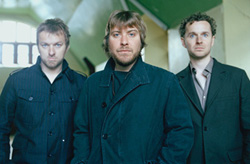 Let me just say, right off the bat, that Doves are one of my all-time favorite bands. Every time you put out a new record, it’s a monumental event to me and my friends.
Let me just say, right off the bat, that Doves are one of my all-time favorite bands. Every time you put out a new record, it’s a monumental event to me and my friends.
Oh thanks, mate! That’s brilliant! Much respect.
With that said, I’d like to ask you about the differences between Some Cities and the first two albums. I know you guys wanted to approach it more like a “live” sounding record, but how did you go about it: Different producer, engineer, microphones, songwriting, etc.?
This time we used a producer named Ben Hillier – who has done Blur and so on – whereas we’ve mostly done everything ourselves. He definitely influenced the way we worked. We wanted this album to be something that could be played: Lost Souls and The Last Broadcast were very precise, computer-oriented albums, and we had done enough of that, I think. In order to move on, for us, we had to try something different. So we got ourselves in a room and jammed non-stop until something came out. It’s more raw and has rough edges, unlike Lost Souls and The Last Broadcast. It’s more organic.
We used a lot of Russian microphones and vintage gear in the studio. A lot of Valve equipment. And Ben really encouraged our approach. We wanted to make a record with imperfections. A record that wasn’t so precise. A lot of the songs are first takes. Well, the hearts are first takes, with everything built around them.
I guess it’s kind of reactionary to the way we use to work. The important thing is that it’s different, and we needed to try something different.
Well, the record is great and American press have been fawning all over it.
Yeah, it’s pretty unreal how great the American press have been.
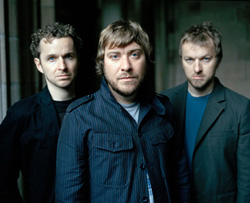 I don’t think I’ve ever read a negative review of any one of your albums, ever.
I don’t think I’ve ever read a negative review of any one of your albums, ever.
It’s weird, you know, cuz when we come over, most of our shows are sold out, and the reviews are great, but we can’t seem to get on mainstream radio at all, which is a bit frustrating. People seem to love the music, but…
I assume you guys are on mainstream radio in the UK all the time?
Well, in the UK, it’s mostly BBC Radio 1, but yeah they play us pretty often.
That’s right: NME even gave “There Goes the Fear” Single of the Year, if I remember correctly.
(modest chuckle) Yeah, that was quite unbelievable. I don’t mean to say that we’re willing to change ourselves to get on radio, cuz we do what we do and are not interested in compromising. We do pretty well in the UK, but in other countries, we still have a bit to go.
I saw you guys on The Tonight Show With Jay Leno, so at least some mainstream outlets are picking you up, right?
Right, and I don’t understand it. (chuckles) I mean, again, we would never cater to a specific expectation just to get more exposure through radio or TV: We play the way we play, we work the way we work, and we just hope that people like it.
Your American fans are definitely pretty fanatical!
Yeah! Every time we come to the States, the shows are always brilliant. Love us or hate us, we don’t want to be one of those bands that you’re “eh” about.
A lot of Some Cities is about your hometown of Manchester: Do all three of you still live there?
Yeah, all of us still live there, but we’re not in town much because we’re always recording and/or touring. (chuckles) I think because of bands like New Order, The Fall, and The Smiths, it’s been proven that a band can be successful and stay in Manchester. You don’t have to move to London. I guess we have Factory Records to thank!
The city is constantly changing, sometimes for the better, but a lot of times for the worse. A lot of the new album is just us being observers of what’s going on. Unfortunately, there’s a lot of corruption right now, people tearing down old, beautiful, historic buildings to put up cheap ones with thin walls just so property owners can make money. It’s really sad. We’ve seen it happen so much within the past two years. The fact that the new buildings are rubbish and the tenants are suffering just make things worse.
On the other hand, a lot of new jobs are being created (because of it), so it’s a double-edged sword, really.
You always tour a lot behind each album. Will you be back to America after this stint in May?
If everything goes according to plan, we should be back in September. We’re also playing Coachella, if anyone is interested in seeing us out west!
(www.capitolrecords.com)

